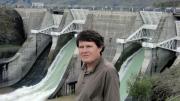John Briscoe, Ph.D. ’76, who advocated for construction of dams in the developing world to enhance economic and social stability, died November 12. He was 66 and had colon cancer, according to an obituary in yesterday’s Washington Post.
Briscoe held professorships in the School of Engineering and Applied Sciences, in the School of Public Health, and at the Harvard Kennedy School. He was also the director of the Harvard Water Security Initiative, an interdisciplinary program for graduate students and undergraduates that combined engineering, legal, and political considerations with fieldwork abroad. His work with Harvard students in Pakistan is described in “The Water Tamer,” a feature article that appeared in Harvard Magazine in 2012.
Before coming to Harvard in January 2009, Briscoe was senior adviser to the World Bank’s $50-billion water program and subsequently the bank’s country director for Brazil. He hoped to develop a new generation of water experts who could grapple with the environmental, financial, and social complexities of constructing dams as a component of efforts to help alleviate poverty and bring political stability to arid regions of the globe. Students in the 2012 program in Pakistan spoke glowingly of their mentor, whose professional background gave them access to high-ranking political leaders and local water engineers alike.
In March of this year, Briscoe won the Stockholm Water Prize, widely known as “the Nobel Prize of water,” for his “unparalleled contributions to global and local management of water—contributions covering vast thematic, geographic, and institutional environments—that have improved the lives and livelihoods of millions of people worldwide.” He provided “the world with tools for peaceful, productive, and equitable management of the Earth’s water resources.”
An obituary also appears in today’s Harvard Crimson.









